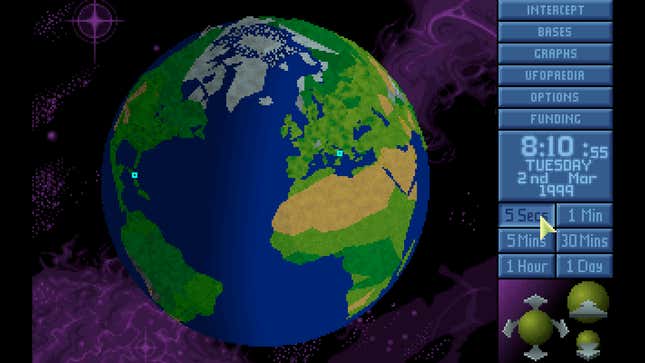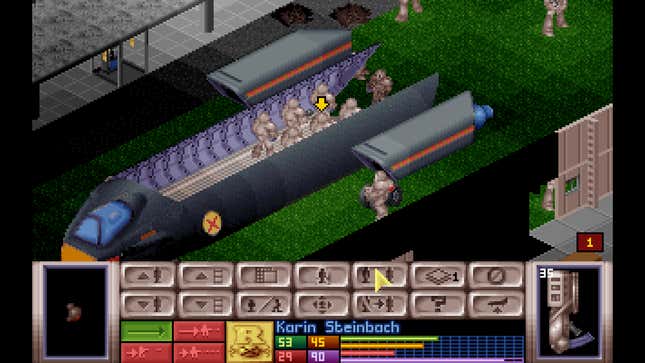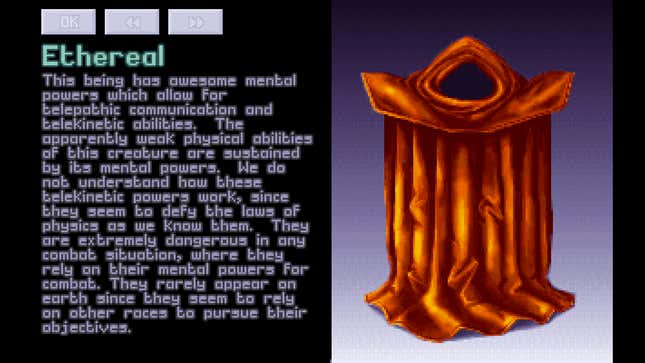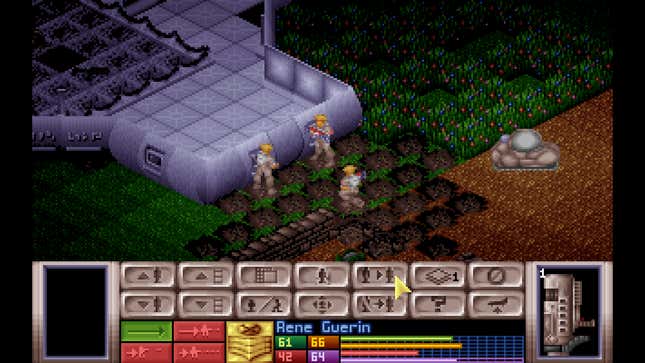Monsters in the Dark: The Making of X-COM: UFO Defense tells the story of the early years of legendary strategy game designer Julian Gollop and the making of the original X-COM, and is funding now on Kickstarter. In this excerpt from the book, MicroProse’s acquisition by Spectrum Holobyte places the game (known as UFO: Enemy Unknown in the UK) in jeopardy, forcing the game’s producers to fly under the radar to save it.
Chapter 11: Silent Mutiny
Great producers do more than keep development teams on track. When bureaucracy shake-ups send tremors through a publishing house, great producers stabilize their teams by shielding them from fallout.
While Sid Meier’s early strategy titles garnered critical and commercial success for MicroProse, other divisions within the studio floundered. The market for flight sims, the company’s big sellers before Meier branched out into other types of sims, was dwindling. Elsewhere, co-founder and CEO “Wild Bill” Stealey had invested millions in an arcade division that would engineer MicroProse 3D, an array of four boards stacked atop one another: one for video, a second for audio, a third for 3D calculations, and a brain that kept the other three in sync. The division only released coin-op two games, a version of F-15 Strike Eagle that boasted stellar graphics but lacked many of the features found in the PC version, and Battle of the Solar System, a first-person action title pitting players against robots. Both games wowed critics with flashy visuals but didn’t attract enough quarters to justify the arcade division’s existence, leading MicroProse to shutter it.

Other problems hit MicroProse overseas. On September 16, 1992, a day later named “Black Wednesday,” the pound sterling collapsed, causing a cascade of financial disasters that drove Britain into a recession. The housing market crashed and many businesses failed. Nine months later, on June 18, 1993, MicroProse co-founder Stealey reached out to Gilman Louie, a good friend and president of fellow sim publisher Spectrum Holobyte, to ask for help. Sid Meier’s Civilization was a hit, but between the millions Stealey had invested in the failed arcade division and the fallout from Black Wednesday, his company was struggling. Stealey and Louie drew up terms for a merger: Spectrum Holobyte would invest $10 million into MicroProse by June 30, and Stealey would resign as president and chief executive.
Following the merger, managers named the conglomerate MicroProse Inc., and made sweeping changes. They closed two UK studios, laid off 40 developers from the Chipping Sodbury office, and started to make publishing decisions.
“Spectrum Holobyte were given control, and they came over to review the product line,” remembers MicroProse UK’s deputy director Pete Moreland. “They looked at UFO and said to cancel it. We said to them, ‘We think it’s a great game. We shouldn’t cancel it.’ Gilman Louie, head of Spectrum, basically said, ‘No. It’s not what we want. Get rid of it.’”

Pete Moreland and MicroProse UK’s director of publishing Paul Hibbard were devastated. They knew cancelations were customary when studio ownership changed hands. New management brought a new vision for developing and publishing, and Enemy Unknown didn’t fit that vision. But their new bosses failed to comprehend the potential of Enemy Unknown.
A few days later, Gilman Louie and the rest of the company brass returned to the States. Moreland, Hibbard, and MicroProse UK CEO Adrian Parr shut themselves in an office, where they proposed a silent mutiny. “We all loved the game and weren’t prepared to kill it off,” Moreland explains.
Adrian Parr had been MicroProse UK’s lead accountant before his promotion to the head of the studio. He knew its finances intimately, so he thought that he, Moreland, and Hibbard could take a calculated risk. “Adrian said, ‘Look, this isn’t a high-cost project. For the amount of finances left to complete it, it won’t be a big draw on resources. We could probably keep it going with no one noticing,’” recalls Moreland. “Adrian said we could do this, so we could.”

Moreland, Hibbard, and Parr tightly guarded word of Enemy Unknown’s cancellation. Stephen Hand, designer and producer at MicroProse UK, and the project’s biggest advocate since 1991, found out years later. “This would all have happened at executive level and so would have been a Paul-and-Pete decision. I learned about it myself only following Julian’s GDC talk in 2013,” says Hand, referring to X-COM lead designer and programmer Julian Gollop.
Not even the Gollops knew what had transpired. To Julian and Nick, life seemed to go on as normal. “There were people within the UK studio, such as the QA team, who were very supportive and enthusiastic about the game,” says Nick.
“It would have been soul-destroying for them,” Moreland adds. “They’d been working so hard on it and had such trust in us. We thought it was better to keep them positive and doing good work. We’d already decided they would get paid for the rest of their contract. There was no reason to tell them at that stage.”

Andrew Luckett, a QA tester on Enemy Unknown, cackled when he won a mission by throwing a grenade through an open roof and blasting every alien in the household into bits. He knew the new regime wasn’t keen on the game and, along with other testers, had lobbied to continue production before MicroProse canceled it. “They had it wrong because it was one of the best games we’d played in a long while,” Luckett recalls. “We also knew our UK management team knew this and they had a certain amount of autonomy. It’s fair to say that without QA being so enthusiastic, it may well have been canceled.”
Just before Christmas, leadership came to Adrian Parr and Pete Moreland with a request: They needed a game, and they needed it yesterday. “The quarterly results Spectrum would have to report were not looking good,” Moreland explains. “They asked if we had anything in development that we could pull forward to the next quarter.”
Moreland smiled. “We said, ‘Actually, that game you told us to cancel? It’s nearly complete.’ And they were thrilled. Suddenly it was the golden game.”
David L. Craddock is the author of the bestselling Stay Awhile and Listen trilogy detailing the history of Blizzard Entertainment, Shovel Knight by Boss Fight Books, and over a dozen more books about video game culture. Follow him online @davidlcraddock on Twitter. Monsters in the Dark: The Making of X-COM: UFO Defense is funding now on Kickstarter.
.


